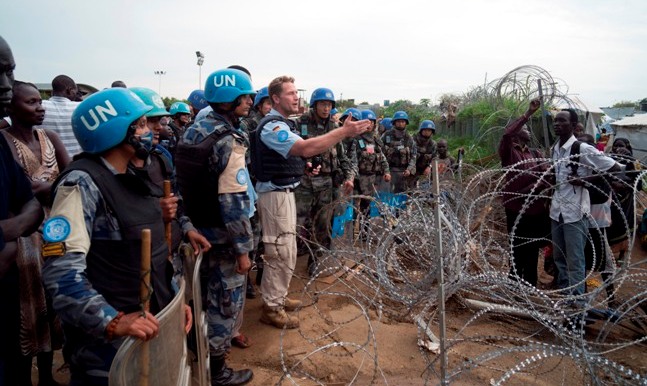South Sudan says protection force does not undermine sovereignty

September 5, 2016 (JUBA) – South Sudan government has downplayed concerns from among senior party and government officials that deployment of protection force from countries in the region as authorized by the United Nations Security Council would undermine national sovereignty.
Officials loyal to President Salva Kiir said they only accepted the deployment in principle, but which details are yet to be agreed upon with the United Nations.
“What the government has done was the reiteration of commitment to implementing peace and to confirm in principle the acceptance of the protection force. But this does not mean this force will be deployed without the consent of the government. The communiqué was very clear. The government will have a role to play in discussing technical matters,” said cabinet affairs minister, Martin Elia Lomuro.
Minister Lomuro, who attempted to allay fears of the pro-government supporters opposed to the deployment of protection force, however said international support to implement peace for the country to be stable was very important part in regional security.
“What is important as the people of South Sudan, regardless of the ruling party in the country, is that we must always have a unique and common goal, which is to maintain peace and stability. President Salva Kiir is up to the task. He wants peace to prevail so that the country can move forward,” he said.
He explained that he is “certain” that all parties interested in maintaining peace in the country “will assist in one way or another” to pursue that goal.
“All parties will work hand in hand, taking into account that peace and stability in the country represent the maximum interest for all relevant parties,” he said.
But while the cabinet affairs minister confirmed the acceptance of the deployment of the regional protection force, other officials claimed that the government did not agree with the United Nations Security Council’s visiting officials to deploy foreign forces without prior consent and agreement on details.
They argued that the government on Sunday in a communiqué it signed with the UN Security Council only “consented” but did not “accept” the deployment of the force.
The “consent” which the government has given, according to opponents of the deployment of the protection force, means that it has agreed in principle to the deployment of foreign troops but not necessarily acceptance unconditionally.
The objective, they argued, was to enable further discussions to take place between the United Nations Mission in South Sudan (UNMISS), the army, and other stakeholders to work out the modalities.
The latest development comes amid fierce internal criticism after it appeared the government buckled under the UN Security Council’s pressure during their three days of visit to Juba.
Before succumbing to the pressure to accept the deployment of forces, President Kiir earlier repeatedly said he would not allow a single additional foreign troop to deploy in South Sudan.
However, after meeting the delegation from the Security Council on Sunday, the government announced that it has accepted the deployment of 4,000 troops to “protect the people of South Sudan”, pending confirmation of its details.
(ST)
